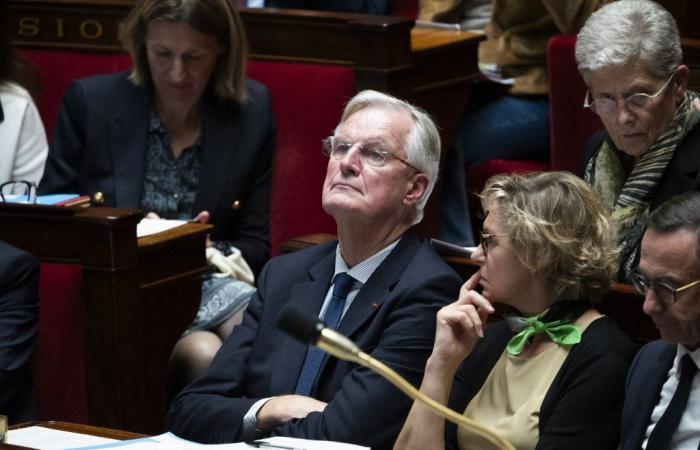Economist and former MEP, Liêm Hoang-Ngoc is co-author of the investigative report on the role and activities of the troika in the euro zone countries and has just published “Europe, enemy of the Republic? » (PUF). In a column, he deplores the return of austerity in the 2025 finance bill, the examination of which begins in the Assembly and recalls its deleterious effects on growth.
The examination of the 2025 finance bill, which begins in the National Assembly, is marked by the return of austerity, which raged throughout the euro zone during the 2010 decade. here, after having saved the banks from the disaster of which they were guilty during the subprime crisis, the States of the European Union (EU) made the people pay the bill through austerity cures administered in doses of horse.
The economists of the European Commission then justified “budgetary consolidation” by the theory of Ricardian equivalence (linked to David Ricardo, liberal thinker of the 18th and 19th centuries). Developed by the American economist Robert Barro in 1974, this model predicts that when the State increases its public spending, economic agents reduce their spending accordingly to save for future generations with whom they show solidarity. And this, in anticipation of the taxes that they will pay when the State levies them to honor the charges of the public debt.
READ ALSO: Budget 2025: savings with vague contours… but sufficient to hamper growth
The model thus considers that the budgetary multiplier, a coefficient measuring the impact of public spending on GDP, is zero, if not negative, if agents include in their permanent income the shortfall represented by the sums invested in forecast of future taxes to be paid. In this case, austerity is presented as beneficial, because it is simultaneously a source of public debt reduction and growth – thanks to the increase in permanent income.
Serving capital holders
Unfortunately, as the work of the team of the former chief economist of the International Monetary Fund (IMF) Olivier Blanchard showed in 2013, the multipliers of the euro zone countries are positive.
“Budgetary consolidation” has therefore not only killed growth, but also increased public debt, since the expected growth (generating tax revenues allowing debt stocks to be absorbed) has not been there.
It is this lesson that Prime Minister Michel Barnier would benefit from meditating. At that time, he was a member of a European Commission whose commissioner for economic and financial matters, Olli Rehn, admitted, during his hearing in the European Parliament regarding the activities of the troika, that his services had probably underestimated the value of the multipliers of the euro zone economies, when making recommendations to each country…
READ ALSO: A 2025 budget to complete… What if we taxed “super-heirs” as Oxfam proposes?
Since then, Europe seemed to have learned the lessons of this austerity decade. The Stability Pact was made more “flexible”, then the derogation clause was activated during the Covid-19 crisis to allow States to successfully deal with the health crisis. The ECB has deployed debt buyback programs to allow states and companies to borrow at low rates.
Certainly, debt rates exploded in 2020, but were reduced rather quickly thanks to the multiplier effect of the measures taken. In France, “whatever it takes” has generated induced tax revenues, reducing the debt rate from 117% of GDP in January 2021 to 110% in 2023, before the decision was made to prematurely suspend the recovery measures, in particular because Germany began to torpedo the reform of the Stability Pact that the Commission was responsible for developing to allow States to invest in the ecological transition.
READ ALSO: Budget 2025: does the left only know how to increase taxes?
Instead of being relaxed, the text was tightened by the budgetary brake imposed in one of the regulations by the German Finance Minister. From now on, states in excessive deficit procedure will have to reduce their public deficit by 0.5 points of GDP every year to reach the target of a deficit of 3% of GDP as quickly as possible.
It is this trajectory that France is failing to achieve, having once again placed itself at the service of capital holders, the main beneficiaries of the tax cuts granted since 2017. However, this policy fails to trickle down to achieve its objectives. of growth. The forecast growth in 2024 was 1.4%. It will probably be around 1%. The induced tax revenues, initially expected, are therefore lacking and the public deficit will reach 6.1% of GDP this year instead of the 5.1 expected…
Uncredible policy
The annual shortfall for public finances, resulting from the accumulation of tax cuts made, corresponds exactly to the 60 billion euros that the Prime Minister is seeking to save to comply with the new PSC (Stability and Growth Pact). The 2025 budget project envisages, in factto make the community pay for the restoration of the tax privileges of the rich (flat tax on capital income, abolition of the ISF, abolition of the tax on dividends, reduction in corporate tax, reduction in production taxes, perpetuation of the CICE, etc.), the effectiveness of which is doubted by France Stratégie reports.
READ ALSO: Ceiling letters, arbitrations from Le Maire and Attal: understanding everything about the challenges of preparing the 2025 budget
Certainly, to calm the smoldering citizen revolt, an exceptional and temporary levy of 20 billion will be made for two years on large companies and high incomes, with the agreement of Medef, but the balance remains generally positive for the “first of roped”. In their amendments, the Macronist deputies will from a stronger strong to plead for “fiscal stability” to avoid reversing most of the tax gift granted, in accordance with the wishes of the French Association of Private Enterprises (AFEP).
Furthermore, to guarantee this fiscal achievement, expenditure in favor of employment, public services and social protection will be drastically reduced by 40 billion euros in order to avoid, in the future, having to resort to possible tax increases.
READ ALSO: Austerity in the face of debt… why Macron and the other “Mozarts of finance” are the losers of the economy
For the economist, the budgetary policy pursued since 2017 resembles the pattern of reversed Ricardian equivalence. While in Barro’s model, austerity conditions the reduction in taxes, supposed to trickle down to growth, Macronian policy is based on a new theorem: yesterday’s reduction in taxes would lead to today’s reduction in spending. today and the growth of tomorrow.
Alas for the Mozarts
Unfortunately for the “Mozarts of finance”, yesterday’s tax cuts have reduced today’s tax revenues and the theorem turns out to be notoriously false when the budgetary multiplier is positive.
READ ALSO: Budgetary savings: Brussels should ask France to go further than planned
As it is likely that it will be greater than unity, a contraction in public and tax expenditure of 60 billion will generate a recessive effect at least equivalent, compromising the growth hypotheses on which the new trajectory negotiated with Brussels to reduce the deficit is based. public at 3% of GDP in 2029… The tax revenue expected to reduce debt will not be there any more tomorrow than today. The policy pursued is therefore not credible and will, sooner or later, have to be censored.






